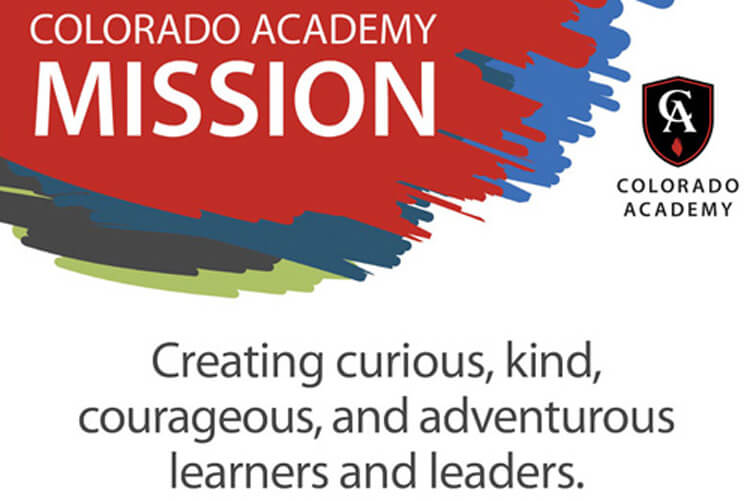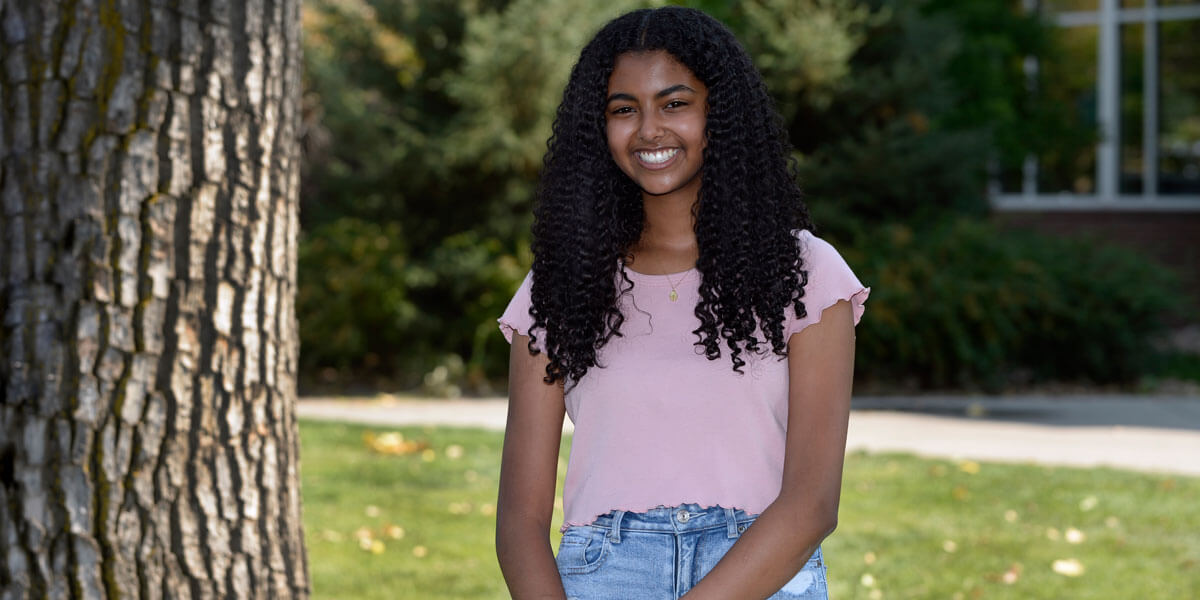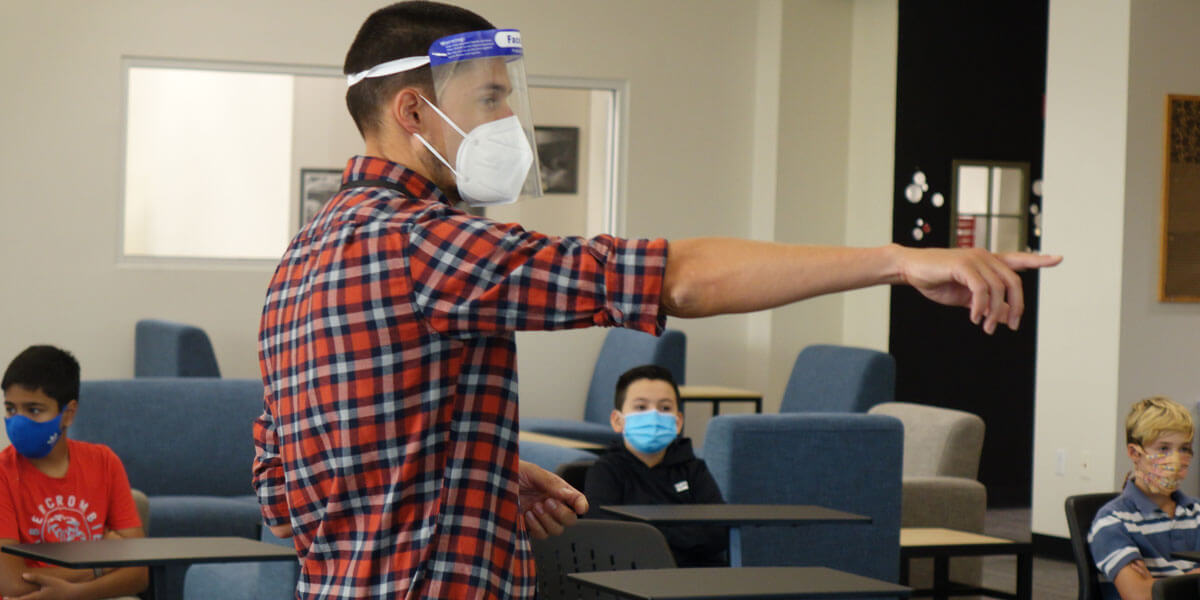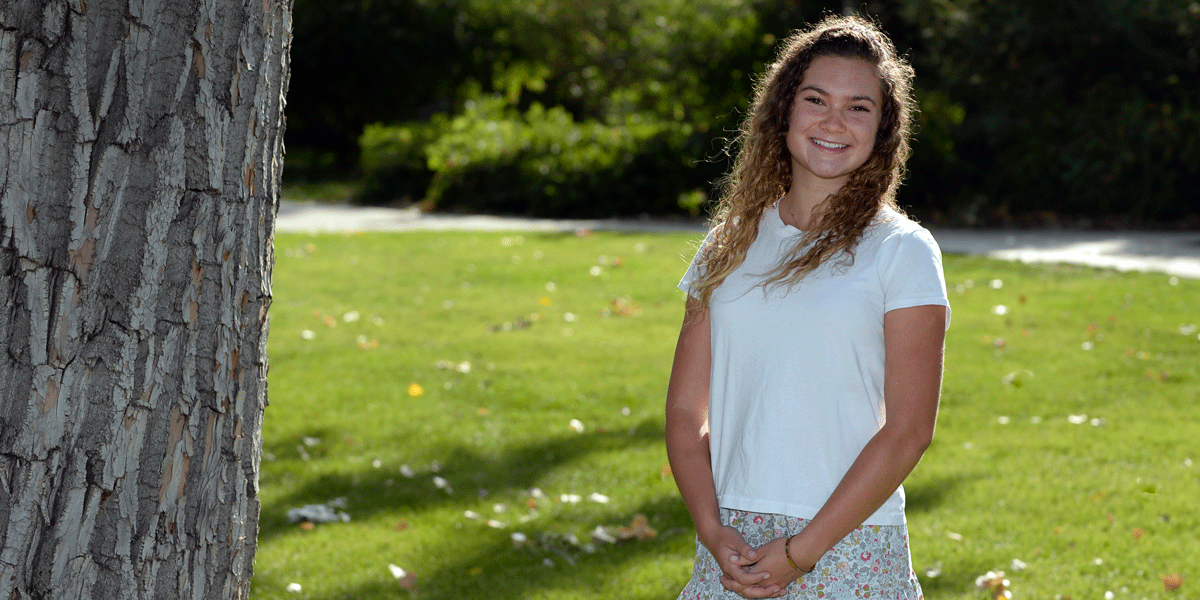 Editor’s Note: This is one of a series of articles about ways that Colorado Academy is living its mission during challenging times.
Editor’s Note: This is one of a series of articles about ways that Colorado Academy is living its mission during challenging times.
Chloe Brants, Senior
Even during a normal year, stepping to the podium at an Upper School Town Hall to deliver the year’s first Senior Speech takes a bit of courage. During a year when the pandemic has split the Upper School in half to reduce class density, and there is no possibility to gather in a group, no audience to speak to, no podium to lean on, it takes a great deal of courage to raise your hand, go first, and truly engage your classmates.
And yet, when Chloe Brants finished her speech delivered over Zoom, sitting at a computer in Senior Dean Gabe Bernstein’s office, this is what she heard through the closed door—clapping. Behind closed classroom doors throughout the Upper School, students were applauding.
“That speaks to the kindness of CA students,” Brants says. “At the end of the speech, I was shaking a little bit; I was nervous, because I had shared things that were personal to me, and afterwards I received so much positive feedback.”
The nucleus of her speech stemmed from Brants’ self-directed REDI Lab project during her Junior year, when she researched religious theory and examined how COVID-19 had changed her peers’ attitudes toward God. She found people who were angry at God, but she came to a different conclusion, one she shared in her speech, excerpted here:
“Through all of the sadness, isolation, and worry, I firmly believe that everybody here at CA, in some way, will benefit from this global crisis. I really do. And I’m here to tell you why.
“The pandemic has brought me to notice that you can’t truly appreciate something until you know what life is like without it. And that’s what COVID has done. It’s shown everybody a way of life without the little things and has robbed everybody here of something. Whether it be sports, theater, a normal routine, time, happiness, a job, a relationship, opportunities, maybe you were like me and you lost a loved one, maybe you had a terrible time in quarantine, maybe it created serious issues for your family, or maybe it was fine for you, but whatever your situation, you have been robbed of something precious, and that stinks. But moving forward, I’m confident that everybody here will eventually get back in their groove.
“Once all of this is over, no masks, no social distancing, no Zoom school, we will love and be so thankful for our way of life on a whole different level than before. It’s this feeling that we have to look forward to. It’s a beacon of hope that will help us into the future. No matter how dark and horrible things might be right now, just remember that these challenges will make life that much better down the road.”

Abby Alem, Sophomore
Last spring, during COVID-19 remote learning, Abby Alem found herself feeling particularly disconnected—distant from her school and church community, “at a loss trying to be safe.” Freshman Dean Meg Hill suggested she enroll in a week-long advocacy institute with the ACLU. Normally, she would have traveled to Washington, D.C., but because of the pandemic the institute was held online. Nonetheless, through this experience, Alem found a new sense of connection.
“We learned about using our voices to stand up for others,” Alem says. “We studied current-day issues and how they affect our communities, and we talked about how to organize for change within our own communities.”
In particular, at the ACLU institute, Alem had more experience with Affinity Groups, gathering opportunities for people with a common identity. Alem was part of an Affinity Group that met every day at the institute and that got her thinking. Could she introduce the same idea to CA?
In an act that she sees as a part of her own personal learning process, Alem wrote a letter to Director of Inclusivity Sarah Wright and explained her proposal.
“I knew my experience was unique and part of who I am,” says Alem. “As great as CA is, I think CA still has room to grow supporting students who are traditionally marginalized.”
In Wright, Alem found a sounding board, and she made connections to other Upper School students who felt the same way she did. The process of forming Affinity Groups is still in the early stages, but Alem says she is “excited to see where it will go.”
“In an ideal world, we wouldn’t need an Affinity Group,” she adds. “But even when things get better in the world, I hope we still have it.”

CA Faculty
Ask Middle School Principal Bill Wolf-Tinsman about where you can find courage in the Middle School, and he answers without hesitation: the Middle School faculty. His words reflect not just on the Middle School, but also on CA’s Lower and Upper School faculty during 2019 and 2020.
“As teachers, we are always modeling, trying to show students different ways they can be a positive force in the community and make good decisions. During COVID, we have also had to be models. Just as we ask students to be courageous, put themselves out there, and receive feedback, we have had to be courageous with our teaching.
“None of us ever thought we would be teaching solely online. We love teaching in person! All of a sudden, that was not possible, and very quickly we had to create an online version of school. The whole Middle School faculty rose to the occasion. They worked very hard, took risks, learned from mistakes, and continued to deliver high-quality education to our students from mid-March to June.
“Then we were given another opportunity—what would be another Sputnik moment for many teachers—teaching half our class in school and half online with Owl cameras. And doing it all with masks!
“We are always asking our students to demonstrate different types of courage. Our teachers have been modeling courage for students every day, but never more impressively than during the COVID-19 pandemic.”
